By P V Gopalakrishnan
Pammal Sambanda Mudaliar, a qualified lawyer, founded Suguna Vilas Sabha, which is located even today next to the erstwhile Plaza Theatre near Cosmopolitan Club on Mount Road, Chennai. He wrote a hundred plays & staged them there. The title of Kamal Hassan’s film, “Pammal K. Sambandam” was his expression of tribute to this ‘Father of Tamil theatre’.
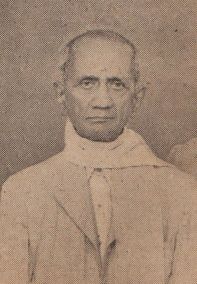
Pammal Sambanda Mudaliar PC: unknown
Sati Sulochana, Vedala Ulagam, Ratnavali, Manohara and Sabapathi, are some of the hundred and odd plays he wrote. The above mentioned plays were also made into successful films. Old Madras luminaries such as S. Satyamurthy, R. K. Shanmukam Chettiar, V. V. Srinivasa Ayyangar, C. P. Ramaswamy Aiyar, V. G. Gopalaratnam and M. Kandaswamy Mudaliar (the father of the famed actor M. K. Radha) have acted in his plays. The British Govt., honored Pammal Sambanda Mudaliar with coveted Rao Bahadur Title, later the Government of India honored him with a Padma Shri Title in 1963.
Kandaswamy Mudaliar was a well known Tamil dramatist and stage actor. When Pammal Sambandham Mudaliar founded the famous ‘Suguna Vilas Sabha’. He became a member of it and took active part in the running of the Sabha. Besides writing plays, he supported his guru Sambandha Mudaliar in the theatre activities of the Sabha.
S.G.Kittappa, trained in music and acting by Sankaradas Swamigal, was a Tamil classical singer and stage actor who was active in the pre-cinema days.
K.B. Sundarambal as a small girl was discovered while singing and begging for alms on trains by F. G. Natesa Iyer, a Railway official, who was also a stage actor, talent – scout and play producer. He introduced her to Tamil theatre. Soon her stage plays such as “Valli Thirumanam”, “Pavalakodi”, “Harishchandra” became great hits during those days
While on a tour of Ceylon she met singer-stage actor S.G. Kittappa to whom she got married and started acting in stage musical plays as pair. KBS and SGK acted in dramas like Thookku Thookki, Nandanaar, Dasavatharam & Aandaal staged by the Kannaiya Nadaga Company. Their fans showered silver coins on stage when they acted. The couple became cult figures. They also took active part in the Indian Freedom Movement. But Kittappa eventually died very young in 1933 at the age of 27 due to which, at this juncture, his young widow K.B.Sundarambal went into isolation.
When the owners of a Sindhi business house, Chellarams, wanted to produce ‘Baktha Nandanar’ they approached KBS who initially resisted the offer. Subsequently, she debuted in that very film in 1935, in the role of Nandanar, for which she was paid a whopping lakh of Rupees. the renowned Carnatic Vidwan Maharajapuram Viswanatha Iyer (father of late Maharajapuram Santhanam) too acted in the very film ‘Baktha Nandanar’ (not to confuse with the subsequently made ‘Nandanar’ featuring M.M.Dandapani Desikar). Having debuted in this film, KBS acted & sang in many movies, notable of which were Gemini’s ‘Avvaiyar’, A.P.Nagarajan directed “Thiruvilaiyadal”, Poompukar, Kandan Karunai & Karaikal Ammaiyar.
PU. Chinnappa, was a popular singer movie actor in Tamil screen from 1930s. At a tender age of 8, Chinnappa joined in Meenalokshani Vidvabala Sabha, run by one Palaniyapillai, under the tutelage of Sankaradas Swamigal. At that time T.K.S brothers were acting in this popular drama company at that time. From there P.U.Chinnappa joined Madurai Original Boys Company for a salary of Rs.15 with a 3 year contract. Chinnappa was very prolific in singing too. When Chinnappa acted as hero, M.G.Ramachandran, P.G.Venkatesan, Ponnusamy and Alagesan were acting as a female lead with him. Kali N Rathinam and M. G. Chakrapaniwere acting in supporting roles.
Chinnappa debuted in the movie Chandrakanta (1936) & continued his career in films like Punjab Kesari, Raja Mohan, Anadhai Penn, Yayathi and Mathruboomi. But the movie Uthama Puthiran was a block buster, catapulting the career of Chinnappa. His movies such as Aryamala & Kannaki made him a box office hero. Several other movies of him like Dhayalan, Dharmaveeran, Pruthivirajan and Manonmani too ran very successfully.
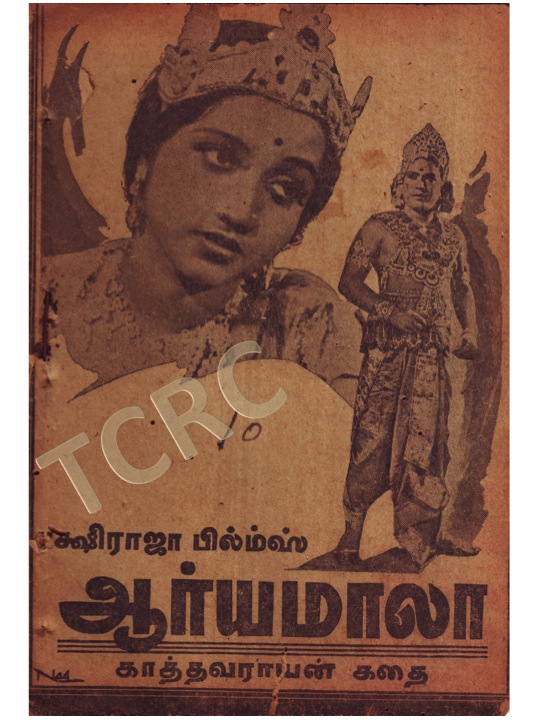
Song book of Aryamala PC: From the archives of TCRC
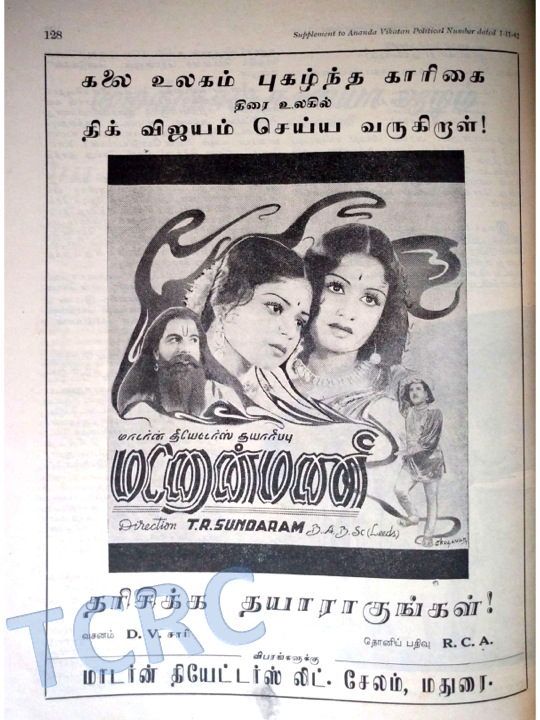
An ad of Manonmani in Ananda Vikatan Deepavali Malar 1942 PC: From the archives of TCRC
It was during this time, the professional competition between M.K. Thyagaraja Bhagavathar and Chinnappa became intense. Vanasundari, Ratnakumar and Sudarshan were the movies that Chinnappa acted last. He passed away in his late thirties in 1951.
One F.G.Natesa Iyer through his Rasika Ranjana Sabha, an amateur theatre group, introduced M.K.Thyagaraja Bhagavathar to Stage when MKT was in his pre-teen years. He also took professional training in Carnatic music. MKT teamed with S.D.Subbulakshmi toured even Ceylon & Burma to stage their dramas successfully.
MKT debuted in ‘Pavalakodi’ (1934), produced by Lena Chettiyar & directed by K.Subramanyam, in the music score of Papanasam Sivan.
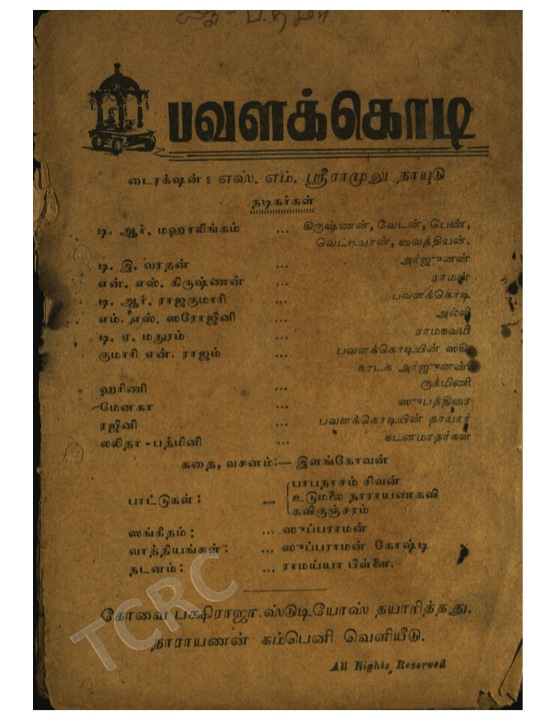
Inside the pages of Pavalakodi song book. PC: From the archives of TCRC
In all, he acted in 14 movies in his life most of which were record breakers. Thiruneelakandar, Ambikapathi, Chintamani were among the highly successful Tamil films. His film Haridas, released (1944) ran continuously for three years at Broadway Theatre, Madras. The super hit film ‘Chintamani’ (1937) lodged MKT firmly in Super Star status. During the period of World War II, MKT staged his plays & gave concerts to collect funds for Red Cross Society.
He was very popular in classical concert circuits when very many doyens ruled the roost in that field.
After ‘Haridas’ was released, MKT emerged as an unequalled singer-actor & in this pinnacle of his career he had to undergo a jail term of three years, along with N.S.Krishnan, though he had been booked for many more films by that time for which he had collected even signing amounts. When he was released from the jail by the higher court in London after three years of jail term, MKT started seeing decline. His own production ‘Rajamukthi’ also bombed. He passed away at his 49 in the year 1959.
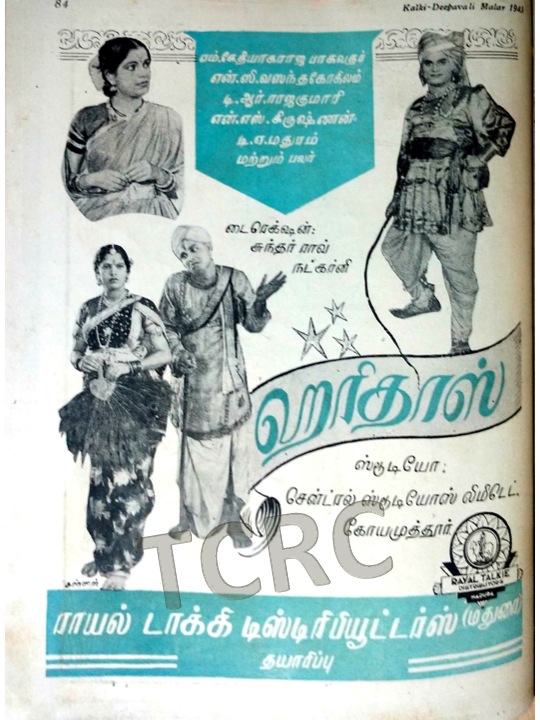
An ad for the film Haridas in Kalki Deepavali Malar 1943 PC: From the archives of TCRC
NS. Krishnan (NSK), the highly acclaimed ace comedian of Tamil Screen of forties & fifties, started his career too on stage. He joined The Original Boys Company in the year 1924, while he was very young. A year later in 1925 NSK joined the Drama Company, ‘Sri Bala Shanmukhanandha Sabha of TKS Brothers where he debuted in a play titled “Savithri”. Subsequently, he worked in various other dramas and donned a variety of roles.
His debut into cinema was through the film ‘Sathi Leelavathy’, produced by Gemini S. S. Vasan, as a comedian. However his debut film was released only in 1936, a year later than his second movie ‘Menaka’ (1935), in which TKS Brothers & K.T.Rukmini acted. ‘Menaka’, based on a play by TKS Brothers, was shot on a schedule of three months at Ranjit Studios, Bombay. Menaka was the first film to use a Bharathiyar song in a movie. The producers were bold to do that despite there having been a ban on Bharathiyar’s works by the British Government.
Soon in his life he added T.A.Madhuram, a co artiste of par excellence, as his spouse, during the shooting schedule at Poona of the film ‘Vasantha Sena’, directed by Raja Sandow. The rest was history with this couple acting together in over 120 movies, as a pair, between 1936 and 1957.
NSK & Maduram were both singing actors. Towards the later part of his career he too was implicated in the Lakshmikantan murder case along with M.K.Thyagaraja Bhagavathar & had to undergo a prison term of thirty months.
N.S.Krishnan produced & directed the movie “Panam” (1952), after his release from jail term, in which he paired music directors Viswanathan & Ramanoorthy first time. Though Ramamoorthy was senior to Viswanathan, NSK decided to have Viswanathan’s name first due to phonetic reasons. And it stayed so!
He passed away in 1957 & few of his films were released much after his demise.
(to be continued)
